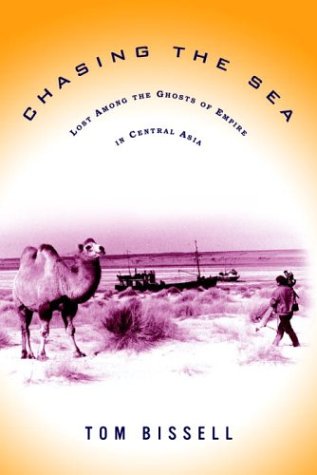
Review of Tom Bissell's Chasing the Sea
LEAVING THE ARAL SEA IN AGONY
Josh Abrams 9/24/04
A EurasiaNet Book Review
In the late 1980s, news of an epic water crisis in Soviet Central Asia first emerged in the international press. The nightmare visions of abandoned fishing boats rusting on the salty former seabed became a haunting commentary on the Soviet "experiment" and begged international assistance. Then, in 1991, the Soviet Union unexpectedly broke up, attention moved elsewhere, and the whole matter was quickly forgotten.
Nearly 20 years after the Aral Sea disaster was first reported, two recent books have brought Central Asia’s water agonies back into public discourse. The first, Chasing the Sea: Lost Among the Ghosts of Empire in Central Asia, by Tom Bissell, is a witty and sensitive memoir of the author’s travels through Uzbekistan in 2001 that ends at the dried seabed of the shrinking sea. The second, The Devil and the Disappearing Sea: A True Story about the Aral Sea Catastrophe, is a fascinating, first-person look into a specific Aral Sea water conservation project and why it was doomed to failure. The two books are distinct in style and substance, but compliment each other in rounding out one of the world’s most gripping environmental news stories.
A journalist and former Peace Corps Volunteer in Uzbekistan, Bissell provides an astute, passionate observation of life in Uzbekistan and the stifling political atmosphere that allows the water crisis – among other problems – to continue unabated. Only the final fourth of the book deals with the Aral Sea itself; It is the end-point of a travelogue that takes the author from Tashkent to the great Samarkand and Bukhara, to the Ferghana Valley and Tien Shan mountains. His fine writing style, often witty without being condescending, packed with fascinating historical details and current events illuminates the narrative with lively characters and occasionally harrowing experiences.
Once Bissell reaches the disaster zone, his travelogue takes on a more haunted tone. His descriptions of international aid workers’ commitment to their task and of local residents’ persistent kindnesses set the reader up for the ultimate tragedy: that the Aral Sea is a disaster that may have no cure.
Robert Ferguson’s The Devil and the Disappearing Sea is also a personal memoir, but of a different type. Ferguson, a Canadian contractor for a World Bank-sponsored water-conservation campaign in Central Asia, writes as a development aid insider, who can expose the difficulties that plague many international projects in Central Asia, and that prevent any effective response to the Aral crisis.
The Devil and the Disappearing Sea describes in great detail the oddballs, dawdlers, and incompetents – both earnest and malignant, both local and Western – who too often make up the staff for international projects. Ferguson records a beguiling account of the petty intrigues, corruption, and personal politics that obsess his local colleagues, and into which he finds himself absorbed. The actual work they do seems always ill-defined and inconclusive. In the end, after a year of working on a project dealing with one of the most catastrophic and dispiriting man-made ecological crises of all time, Ferguson leaves the reader with a feeling that such initiatives can indeed prove nothing more than a charade.
Ferguson’s language is often clunky and he takes too much time to set the story up – his attempts at historical overview are not as effective as Bissell’s and show a few minor inaccuracies – but, once he gets rolling, the book becomes something of a page turner, complete with a murder mystery and a high-speed car chase.
Much of the terrible inertia that both Ferguson and Bissell describe is closely related to the political situation found in each of the five Central Asian states affected by the shrinking Aral Sea -- Kazakhstan, Uzbekistan, Kyrgyzstan, Tajikistan and Turkmenistan. According to the authors, none of these countries has shown the political will or economic sense to seriously tackle water-waste issues. In Uzbekistan and Turkmenistan, the region’s most profligate water users, real authority to challenge national policy or suggest meaningful changes is largely non-existent. The most disheartening example of this dearth in political will is the Central Asian governments’ compromise choice to head the international effort to save the Aral: Rim Ginyatullin, a Soviet irrigation planner who was instrumental in causing this very crisis.
Of the two books, Chasing the Sea is more powerful, both in its greater breadth and evocative style. Bissell has a knack for the breadth and complexity of the region’s history and effectively conveys the actual feel of life in modern Uzbekistan. His book is also the better known – The Devil and the Disappearing Sea was only published in Canada and, sadly, is not available in US bookstores. Ferguson’ book is brave for naming names and sharing blame, and for that alone deserves to be read by a wider audience.
Taken together, the two books effectively convey the ineptitude and corruption, that cause – and are caused by – the Aral disaster. Both books end with frustrating assessments of one of the world’s worst man-made disasters. And both convey the message that the real tragedy of the Aral Sea is the dearth of real solutions.
Editor’s Note: Josh Abrams is a freelance writer based in New York.



